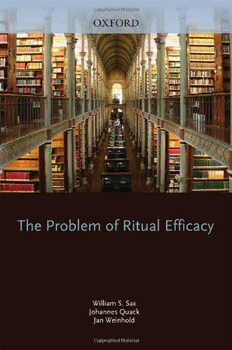
The Problem of Ritual Efficacy PDF
204 Pages·2010·0.761 MB·English
Most books are stored in the elastic cloud where traffic is expensive. For this reason, we have a limit on daily download.
Preview The Problem of Ritual Efficacy
Description:
How do rituals work? Although this is one of the first questions that people everywhere ask about rituals, little has been written explicitly on the topic. In The Problem of Ritual Efficacy, nine scholars address this issue, ranging across the fields of history, anthropology, medicine, and biblical studies. For ''modern'' people, the very notion of ritual efficacy is suspicious because rituals are widely thought of as merely symbolic or expressive, so that - by definition - they cannot be efficacious. Nevertheless people in many cultures assume that rituals do indeed ''work,'' and when we take a closer look at who makes claims for ritual efficacy (and who disputes such claims), we learn a great deal about the social and historical contexts of such debates. Moving from the pre-modern era-in which the notion of ritual efficacy was not particularly controversial-into the skeptical present, the authors address a set of debates between positivists, natural scientists, and religious skeptics on the one side, and interpretive social scientists, phenomenologists, and religious believers on the other. Some contributors advance a particular theory of ritual efficacy while others ask whether the question makes any sense at all. This path-breaking interdisciplinary collection will be of interest to readers in anthropology, history, religious studies, humanities and the social sciences broadly defined, and makes an important contribution to the larger conversation about what ritual does and why it matters to think about such things.
See more
The list of books you might like
Most books are stored in the elastic cloud where traffic is expensive. For this reason, we have a limit on daily download.
